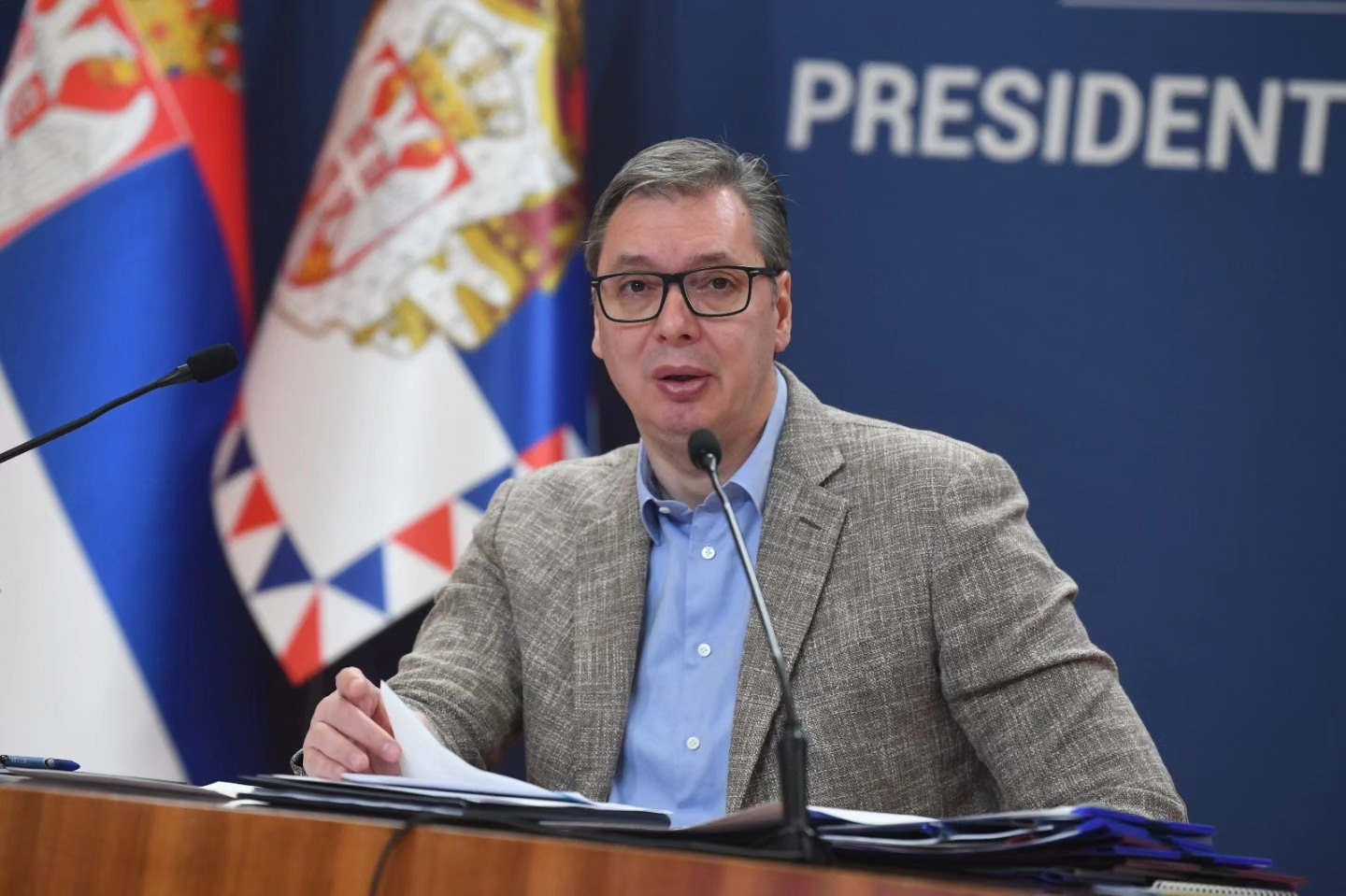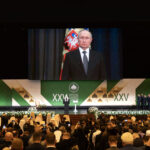On March 26, Serbian President Aleksandar Vučić warned Serbians that their country, as well as Republika Srpska, are facing some challenging times.
“Difficult days are ahead for Serbia,” he wrote on social media. “At this moment, it is not easy to say what news has been learned in the past 48 hours… The vital national interests of both Serbia and (Republika) Srpska are directly threatened. In the coming days, I will inform the people of Serbia about all the challenges we’re facing. It will be difficult, the most difficult thing so far. We will fight. Serbia will win.”
The tension has been building up until Friday while politicians and experts were putting forward their versions regarding the possible threats that the Serbian president referred to.
Late in the evening on Friday, March 29, Vučić delivered a speech explaining what he meant when he warned of hard times looming over Serbia.
Kosovo on the way to the Council of Europe
In his address on March 29, the president of Serbia named the process of Kosovo being accepted into the Council of Europe (CoE) the first challenge.
The Committee on Political Issues and Democracy of the Council of Europe approved the conclusion of the rapporteur on the Kosovo issue, Dora Bakoyannis, who recommended that Kosovo’s accession to the Council of Europe be approved. It is assumed that the final decision on the issue will be made in May.
It is predicted that the leadership of Serbia was outraged by the very fact that the Council of Europe is actually adding a partially recognized country, a “territory”, to its ranks. But the fact that the Council of Europe did not pay attention to the numerous complaints from the Serbian side about the violation of the rights of Serbs in Kosovo caused even more complaints in Vučić’s speech. The Serbian president elaborated on why Pristina does not deserve to join the Council of Europe, illustrating his story with examples of discrimination and repression targeting Serbs in Kosovo.
Another mistake of the CoE, the Serbian authorities believe, was that during the consideration of Kosovo’s application, Pristina’s failure to fulfill its obligations under previously agreed (EU-mediated) accords has not been taken into account. It is, first of all, about the failure of the Kosovo authorities to create the Association of Serbian Municipalities (ZSO). Although earlier both the EU and the USA declared the need to implement this agreement, in the context of joining the Council of Europe, the ZSO was not mentioned. The only condition that Pristina had to fulfill before the accession procedure began was returning the land to the Veliki Dečani Monastery (Serbian Orthodox Church), and that condition was met.
The change in Greece’s attitude to the Kosovo issue was another thing that outraged the Serbian president, as well as in the Serbian political community. In his address, Vučić harshly criticized the position of the Kosovo rapporteur, Dora Bakoyannis, the representative of Greece in the CoE Committee, who offered to support Kosovo’s application without any additional conditions.
Belgrade has traditionally counted on the support from Athens in advancing its vision of the Kosovo issue because Greece has not recognized Kosovo’s independence, and because of long-standing Serbian-Greek ties in historical, cultural, and religious dimensions. Accordingly, the position of the Greek delegate in the Council of Europe is perceived by the Serbian authorities as overly emotionally-driven.
In recent speeches, the president of Serbia chose to stop short of exploring Serbia’s possible steps in response to Kosovo’s potential accession to the CoE, noting that the reaction will be “powerful and responsible”. “We will continue to discuss this, I am ready to listen to the opinion of the Assembly (parliament) and government. We will prepare and wait,” said Vučić.
It is clear that Kosovo’s accession to the Council of Europe causes indignation in Serbia including because it actually marks a new stage of recognition of Kosovo’s independence. That is why it is critical for the Serbian leadership to prevent it from happening, but if it does – to do everything so that the step does not lead to a “domino” effect. Therefore, Vučić’s statement about a “powerful reaction” cannot be taken as empty words.
However, it is noticeable that in his latest addresses, the Serbian president never pedaled the topic of Serbia’s possible withdrawal from the Council of Europe, likely due to the lack of confidence in a wide public support for this step. But the closer the date of the final decision regarding Kosovo’s admission to the CoE, the more relevant the issue may become. With the support of government-sponsored propaganda, it remains possible to actually gain public backing for such a move.
Other demarches, which Belgrade has not yet announced, cannot be ruled out either.
The resolution on genocide and its implications
Another challenge currently facing the Serbs, according to the Serbian president, is the expected adoption in April at the UN General Assembly (UNGA) of a resolution recognizing the mass killing of Bosniaks in Srebrenica in 1995 as genocide.
As is known, in 2015, a similar decision saw no support in the UN Security Council due to the veto imposed by Russia. Now the consideration was initiated by Germany (and, formally, Rwanda), however, Vučić accuses the West, which will be supported by Muslim countries, of putting the idea forward. “Western countries want to put us in a difficult position,” he said. “Against us will stand the collective West, … plus a significant number of Muslim countries.”
The resolution of the UN General Assembly will not be binding, but the Serbian president does not rule out that after recognizing the events in Srebrenica as genocide, Republika Srpska’s right to exist as an entity allegedly formed on the basis of genocide will be put into question. In addition, in his opinion, “based only on a single non-binding verdict, the Republika Srpska will also be required to pay war reparations.”
However, the question arises, where such threatening forecasts come from in the first place.
First, the possible adoption of the Resolution at the UN General Assembly has no legal implications (the Serbian president admits it, too).
Second, the genocide in Srebrenica has ALREADY been internationally recognized. Back in 2007, the UN International Court of Justice in The Hague recognized the killing of 8,000 Bosnian Muslims in the city of Srebrenica in 1995 as genocide. It is not clear why things should suddenly change after the adoption of a non-binding document by the UN General Assembly.
It is significant that, in addition to Vučić, two of the most pro-Russian politicians in the region – Milorad Dodik and Aleksandar Vulin – as well as Russian propaganda media, are putting more oil in the fire over the potential UNGA resolution.
Whoever authored these alarmist scenarios and whatever evidence they were based on, the main thing at the moment is that the Serbian leadership believes in them and will act based on these forecasts.
Belgrade’s response
But what exactly are the Serbian authorities going to do about the difficult days ahead?
As already mentioned above, in his address, Vučić did not mention any specific steps that would be taken in connection with Kosovo’s accession to the CoE, and neither did he dwell on Serbia’s potential response to the adoption of the resolution on Srebrenica and probable further actions in relation to Republika Srpska.
However, in general terms, or hints, Vučić did clarify some of his short-term plans.
In the foreign policy arena, Serbia will try to convince its Western partners, but at the same time, seek support outside the “collective West”.
During his speech on March 29, Vučić announced a visit to France at the invitation of Emmanuel Macron. “I received an official invitation from French President Macron, this visit will be of great importance for Serbia, I will ask him to take into account international legal norms, especially the obligation to create the Association of Serbian Municipalities,” he said.
At the same time, during the presidential address, in the presence of Serbian government officials, it was announced that Vučić had received an invitation to participate in the BRICS summit (Brazil, Russia, India, China, South Africa, Egypt, Ethiopia, Iran, and United Arab Emirates) as a special guest. It is clear that the time and place of the announcement were anything but accidental – it served as a warning to the West that Serbia would try to find friends outside of Europe if its European partners turn their backs on it (by accepting Kosovo into the CoE or mentioning the genocide in Srebrenica…)
“A battle awaits us again” (“Opet smo pred bitkama”)
Serbia’s domestic political game will also change.
Vučić’s latest statements demonstrate that the Serbian leader is trying to rally citizens (around himself) in the face of looming threats. This may mean that there will be more authoritarianism and less democracy in the country.
Another sign of change is Serbia’s ongoing militarization. Recently, Vučić has been a regular and frequent guest at military exercises, weapons exhibitions, defense factories, and research institutes, held meetings with the military, constantly stressing the need to strengthen Serbia’s defense capabilities. This course will be finalized after a new government is put in place – the Serbian president has pitched the current First Vice Prime Minister and Minister of Defense Miloš Vučević for the post of Prime Minister. Vučević will replace Ana Brnabic, who was once appointed to showcase Serbia’s liberalism and the country’s focus on economic development. The appointment should probably demonstrate that Belgrade has changed priorities toward protecting national interests, primarily by beefing up its national defense, developing its military industry, and strengthening of the army…
“We will fight. Serbia will win”, these words from Vučić’s Facebook posting on March 26 can be considered a brief action plan of the Serbian authorities, in particular, the new government.
Only time will tell what exactly the Serbian leader meant when he applied the words “fight” and “win” and whether these statements of his are not a harbinger of difficult times for the entire region…



